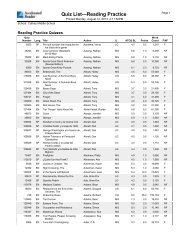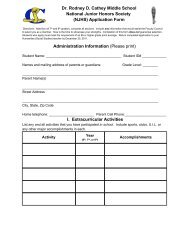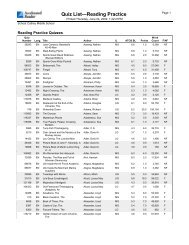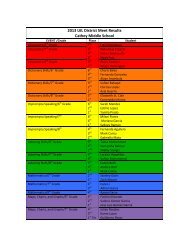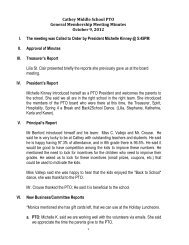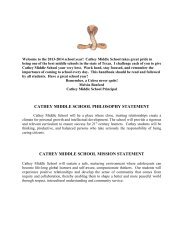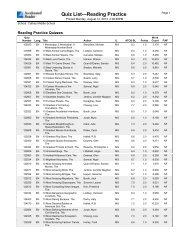Faculty Handbook - Cathey Middle School
Faculty Handbook - Cathey Middle School
Faculty Handbook - Cathey Middle School
Create successful ePaper yourself
Turn your PDF publications into a flip-book with our unique Google optimized e-Paper software.
Dr. Rodney D. <strong>Cathey</strong> <strong>Middle</strong> <strong>School</strong><br />
an Authorized IB World <strong>School</strong><br />
Five broad areas known as the Areas of Interaction give the MYP curriculum its<br />
distinctive core and reflect the programme’s focus on students’ intellectual and social<br />
development. These are not academic subjects like the specific disciplines, but rather are<br />
common perspectives embedded within and visible across academic subjects. They<br />
provide a framework of learning, allowing connections among the subjects themselves.<br />
IB MYP Areas of Interaction<br />
Approaches to Learning<br />
APPROACHES TO LEARNING is central to the programme, as it is concerned with<br />
developing the intellectual discipline, attitudes, strategies and skills which will result in critical,<br />
coherent and independent thought and the capacity for problem solving and decision making. It<br />
goes beyond study skills, having to do with learning how to learn and with developing an<br />
awareness of thought processes and their strategic use.<br />
Through approaches to learning, teachers provide students with tools to:<br />
• Take responsibility for their own learning.<br />
• Develop awareness of how they learn best.<br />
• Develop problem solving and decision making.<br />
• Develop awareness of thought process and learning strategies.<br />
• Develop critical, coherent and independent thought.<br />
Community and Service<br />
COMMUNITY AND SERVICE starts in the classroom and extends beyond it, encouraging<br />
responsible, caring participation in the local environment and in the wider world. The emphasis is<br />
on developing community awareness and concern, a sense of responsibility, and the skills and<br />
attitudes needed to make an effective contribution to society.<br />
This component extends learning beyond the classroom and requires students to:<br />
• Take an active part in the communities in which they live, thereby<br />
encouraging responsible citizenship.<br />
• Develop a sense of responsibility.<br />
• Develop skills to make an effective contribution to society.<br />
• Develop community awareness and concern.<br />
38



